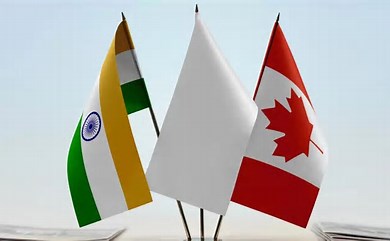Global affairs keep changing their shape based on the common multilateral objectives of various nations, their national interests and the political will of their leaders. Amid this complex criss-cross of personal political agenda of the leaders, national interests of their respective nations and the bilateral & multilateral developments, this week also emanated with various developments across the world. However, the diplomatic brawl between Canadian and Indian governments took a centre stage in the global affairs. This week, India recalled its High Commissioner from Canada in response to rising diplomatic tensions. This action was conveyed to Canadian Chargé d’Affaires, who was called in by the Ministry of External Affairs in New Delhi. During this meeting, it was made clear that the “unfounded targeting” of the Indian High Commissioner and other diplomatic personnel in Canada is wholly intolerable. India has also reiterated its position that the Trudeau administration has deliberately allowed an environment in which violent extremists and terrorists can target, threaten, and intimidate Indian diplomats and community leaders residing in Canada.
Tensions between India and Canada have been continuously intensifying since Trudeau’s allegations on Indian government’s involvement in the killing of Khalistani terrorist Hardeep Singh Nijjar. This ‘domino effect’ series of worsening relations between the two nations started when Canadian PM Trudeau claimed ‘credible allegations of a potential link’ between Indian government and the killing of Nijjar (read: a Khalistani terrorist as declared by Indian government). Then, Canadian government expelled a top Indian diplomat amid probe into the killing of pro-Khalistan terrorist Nijjar. Despite clear statements from the concerned authorities of Indian government time and again that it had no role in this entire incident, Trudeau continued with spitting venom on India. India also asked one of the key Canadian diplomats to leave the country within five days as its response. Trudeau also contacted the five eyes intelligence alliance that includes the UK, US, Australia, New Zealand and Canada itself to get their support against India, however they have maintained a strategic neutrality over the issue.
Now the question arises why Trudeau is continuously maligning the image of India with his anti-India statements? Why he preferred to deteriorate relations between India and Canada instead of supporting India in ensuring its national security? Well, the answer lies in the political ambitions of Trudeau. There are many research surveys and reports that show that Trudeau’s popularity is declining, and he has a huge challenge of gathering support from various parties and leaders to maintain his political position and save his minority government. It seems Trudeau has a habit of inviting problems for himself. First, he called for early elections in Canada in 2021 that resulted in a minority government for Trudeau. At this juncture, Jagmeet Singh, the leader of the New Democratic Party helped Trudeau with his won seats, and played a significant role in his government formation. His support matters a lot to Trudeau. Jagmeet Singh is an open Khalistan supporter and critic of Indian government. It seems Trudeau tried to win the trust of Singh and the associated separatist leaders by making imprudent (read: foolish) statements against Indian government from time to time. This time, it backfired.
Also, a special report from a prominent Canadian parliamentary committee identified India as the “second most significant foreign challenge” to Canada’s democratic system. The report stated that India’s efforts to interfere in foreign affairs have gradually increased, and it became evident during the review period that these efforts expanded beyond countering pro-Khalistani activities in Canada. It was also alleged that India sought to influence Canadian democratic processes and institutions by targeting Canadian politicians, ethnic media, and Indo-Canadian ethnocultural communities. Earlier this year, unclassified documents from the Canadian Security Intelligence Service implicated several countries, including India, in interfering with Canada’s elections. Although India vehemently denied any involvement and dismissed the Canadian allegations as “baseless”. Later all the allegations against India were proved to be false. The inquiry into allegations of foreign intervention in Canadian elections concluded that there was no evidence of India attempting to interfere in Canadian politics. However, testimony during an official probe revealed that China had interfered in Canada’s last two elections.
Trade relations between India and Canada have already gone for a toss, and the latest statements from the Canadian authorities as well as Khalistani leaders like Pannu will further worsen the relations. Trudeau is also forgetting that most of the Indian diaspora in Canada comprises skilled, peace-loving people and even a majority of Sikh community settled in Canada loves their motherland. He needs to learn that one should not put international relations on stake for vote bank politics. While on the other hand, the mighty nations need to understand that they need not to refuse peace proposals just because they are prepared or proposed by their opponent nations. If its worth is well understood, peace is simple to attain and maintain, otherwise, it is too expensive. Just remember the first and the second world wars!
The author is Professor, School of International Studies, JNU







